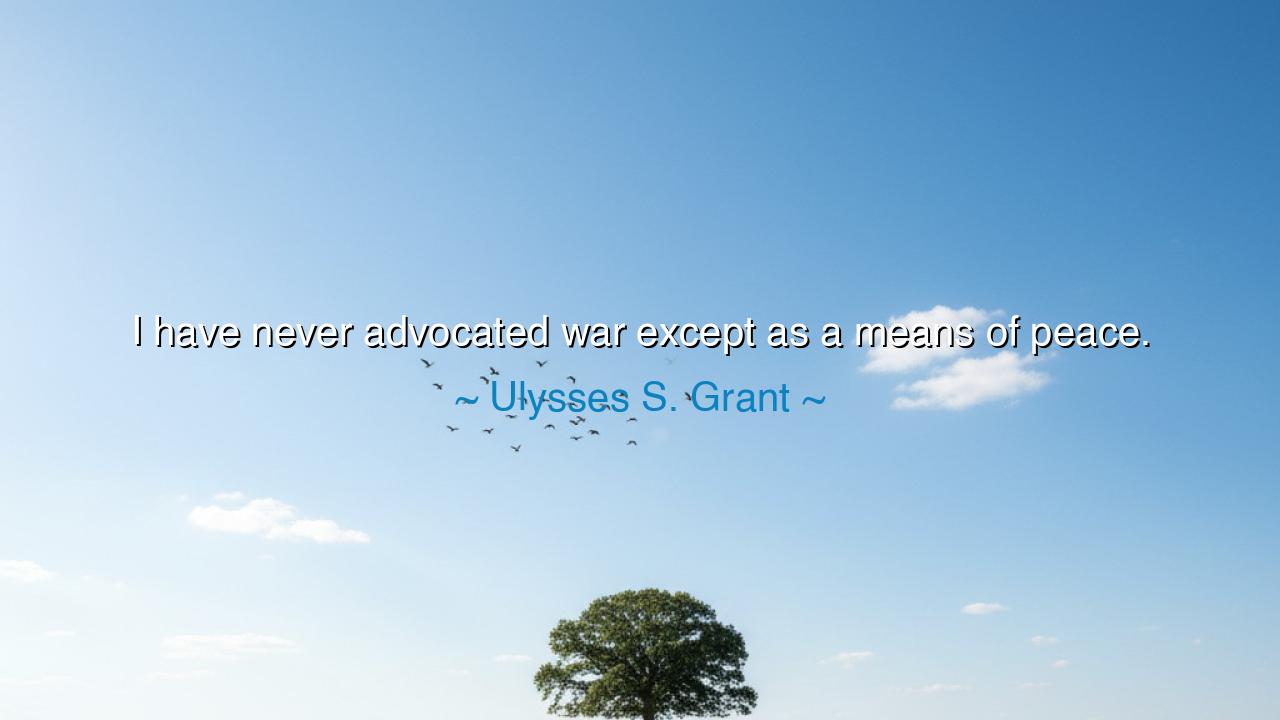
I have never advocated war except as a means of peace.






Ulysses S. Grant, soldier and president, a man tempered by the fires of America’s bloodiest conflict, declared with solemn weight: “I have never advocated war except as a means of peace.” These words, spoken not in the heat of battle but in the calm of reflection, carry the voice of one who had seen the fields strewn with the dead and had heard the cries of a nation divided. They are not the boast of a conqueror, nor the call of an aggressor, but the testimony of a man who understood the paradox of history: that sometimes the sword must be unsheathed, not for glory, but that peace might be born from its strike.
The ancients, too, knew this bitter truth. The Romans spoke of bellum iustum, the just war, fought not for conquest but for defense, for the preservation of order, for the hope that strife might yield to stability. Even the wise King Solomon, in all his yearning for peace, declared there is “a time for war, and a time for peace.” For while peace is the highest good, there are moments when it cannot be won by gentle words alone, but must be secured through struggle, lest cruelty and chaos consume the innocent. Grant’s voice joins theirs, affirming that war, if ever chosen, must never be its own end, but only a terrible means toward a greater peace.
Grant’s own life was bound to this truth. As commander of the Union armies in the Civil War, he did not lust for combat. He did not revel in bloodshed. But he saw that slavery had chained millions, and that the Union itself stood at the edge of ruin. Words had failed, compromises had broken, and diplomacy lay shattered. Thus, he bore the burden of war — not for conquest, but so that a truer peace could be forged, a peace in which the nation would be whole and liberty extended to all. His relentless campaigns, his unyielding will, were not born of cruelty, but of necessity. For he knew that only by enduring war could the land be freed from its long torment.
And when the guns fell silent at Appomattox, Grant revealed his heart. To Robert E. Lee and the Confederate soldiers, he offered generous terms. There was no vengeance, no humiliation, no slaughter of the defeated. Instead, he sought reconciliation, urging his men to honor their foes and treat them with dignity. For Grant understood that the war was never for the joy of war, but for the birth of peace. Here, in his mercy, the truth of his words shone brightest: war was but the passage; peace was the destination.
Children of tomorrow, take this lesson to heart: do not glorify war, nor rush to it with eagerness. It is a beast that devours lives, families, and nations. But also, do not deceive yourselves into believing peace can always be won by silence or surrender. There are evils that will not yield to words alone — tyranny, injustice, oppression. Against such forces, resistance may be required, not because we love war, but because we love peace enough to fight for it.
The lesson is clear: let war never be your first thought, nor your second. But if it must come, let it come with heavy heart and resolute hand, always remembering its purpose: not conquest, not revenge, not pride, but the restoration of peace. In your own lives, this truth may be smaller but no less real. Conflict in family, in work, in friendship — do not seek it, but if it must arise, endure it with the aim of healing, not of destruction. For the goal is never the fight itself, but the peace that follows when justice is restored.
Practical action flows from this wisdom. Be slow to anger. Be swift to reconcile. Seek solutions through patience and dialogue, but do not shrink when courage is demanded. And above all, measure every conflict by this question: Does this struggle serve the cause of peace, or only my own pride? If it serves peace, endure it with dignity. If it serves pride, abandon it, lest you be consumed by war without end.
So let it be remembered, carried upon the tongues of future generations: “I have never advocated war except as a means of peace.” These are not the words of weakness, but of strength tempered by sorrow. To fight only for peace is the mark of wisdom; to live for peace alone is the mark of greatness. And those who embrace this path will leave behind not scars of war, but legacies of harmony, justice, and unity.






AAdministratorAdministrator
Welcome, honored guests. Please leave a comment, we will respond soon